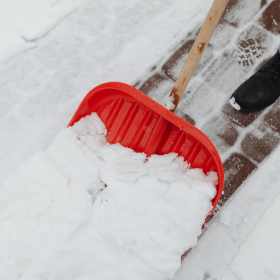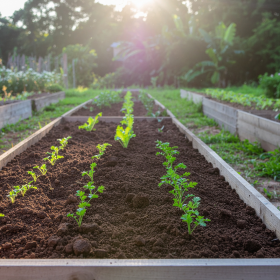
Planting the Plains
Airs Thursdays at 10:30 am CT and Saturdays at 8:35 am CT
Every week, Anthony Reardon presents Planting the Plains, a weekly feature designed to provide the High Plains with timely, yet timeless, research-based, reliable, horticultural information that can assist in bettering everyday lives by easing the burden of troublesome landscape issues.
Each episode will bring a new horticultural, entomological, or wildlife topic to the forefront, furthering practical knowledge on how that topic pertains to the average person, and how that person may need to address such a topic in their own backyard.
To reach Anthony with questions or comments, please send him an email!
Latest Episodes
-
Let’s talk a bit more about pruning your fruit trees. It’s not just a question of how to do it, but also of why. Here’s a hint: it’s not just about making the tree look nice. In fact, pruning your tree correctly will make a difference in every piece of fruit it produces, and this week, we’ll talk more about how (and why!) it’s important to prune correctly.
-
It can really make sense to do some soil testing in your garden, to make sure you really know what you're growing in, and going about it in the right way. After all, dirt's not a "one-size-fits-all" proposition, and this week, we'll talk about what you can learn from the testing, and how it can keep you from actively damaging the ecosystem!
-
It’s mid-February, and one of the best parts about gardening on the High Plains is that we’ll be doing it before too long! Once the ground starts to thaw, you can get some parts of your garden kicked into high gear by having seedlings ready to go as soon as you’re able to dig. Starting your seedlings indoors in late winter gives you a head start, and lets you start growing even earlier in the year, and we’ll talk more about other benefits in this week’s episode!
-
Whenever we get a blast of that arctic air making things cold where we live, it occasionally brings snow and ice with it. But when it comes to clearing your driveway, most of us either shovel it, or get some assistance from salt or a chemical blend that'll melt that ice away. The only problem is that there's more than one type of chemical, and salt can be bad for your concrete as well as your plants. This week, we'll talk about how the various ice melt products are made, and which might be the best choice for you!
-
No matter what you're planning to grow, it's safe to say that a resilient garden is probably near the top of most peoples' list. Learning more about what plants are likely to grow well in your area, and getting your soil tested, will go a long way in identifying plants that can tolerate your local growing conditions, and what sort of remediation work might be needed to help create the ideal soil for your chosen plants. We'll talk more about how to make your garden resilient in this week's episode!
-
While there IS an art to planting a vegetable garden, don't feel bad for not feeling like an artist if you're new to it. In fact, a little experimentation and failure are to be expected, since that's how you learn what works, and what doesn't.
-
Growing vegetables in your garden should be a joy, not a pain, but sometimes it helps to take a step back and think about how much you may be straining to maintain your plants. You can save yourself from this strain (and possible injury over time) by considering ways to make your plant caring easier, and less wear-and-tear on the gardener, which we'll discuss in this week's episode!
-
Getting a feel for microclimates can really open up your options in some ways...it might lead you to plant one or more crops earlier than others, or to help determine where in your garden to place certain items that require more or less hydration if your plot is uneven. Learn more in this week's episode, and see if it might have applications in your own garden!
-
Landscaping can really add to the appearance of your home. But here on the High Plains, it can also pay to be practical to factor in the risk of wildfires when designing your yard.
-
Do you immediately remove any weed you see in your garden? And do you actually stay out of your garden during the winter? These actually aren't even the biggest questions facing you when it comes to addressing winter weeds.











